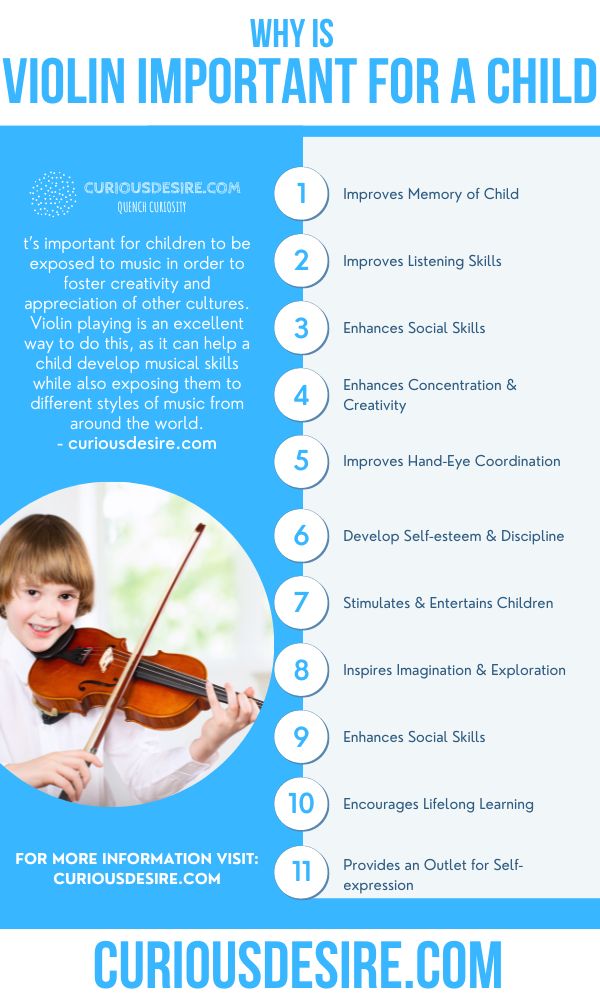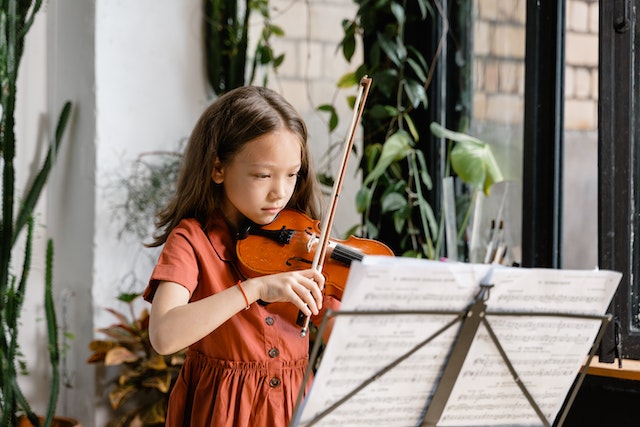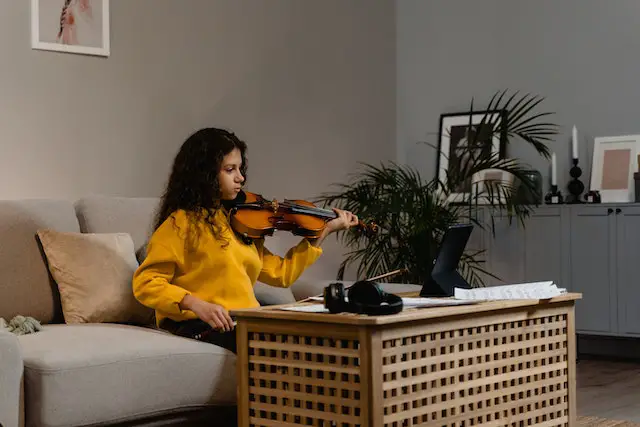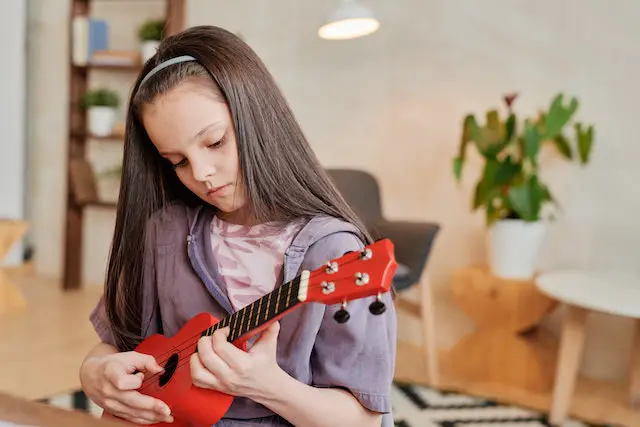The Violin has been a beloved instrument of many cultures for centuries, and it’s easy to see why. Its sweet, melodic sound can be soothing to the soul, while its range of notes allows for a great range of musical expression.
It’s important for children to be exposed to music in order to foster creativity and appreciation of other cultures. Violin playing is an excellent way to do this, as it can help a child develop musical skills while also exposing them to different styles of music from around the world. In this article, we will discuss why violin is important for a child:
15 Benefits of Violin for a Child
The violin is a great way for children to express themselves musically. It encourages the development of fine motor skills, hand-eye coordination and concentration while enabling them to produce beautiful music with their own hands. Here are 15 reasons why violin is important for a child:
1. Violin Improves Memory of Child
Practicing the violin strengthens a child’s memory and helps them recall musical pieces more easily. With regular practice, a child’s memory will improve and they will be able to remember more difficult melodies.
For instance, playing the notes of a song in the right order and learning how to play different pieces requires a level of memorization that helps children with their overall memory skills.

2. Violin Improves Listening Skills
When learning to play an instrument, children must be attentive to the details of their music. They need to pay attention to rhythm, dynamics, and tone in order to produce a beautiful sound. This sharpens their listening skills by teaching them to distinguish between tones and sounds.
Additionally, playing the violin helps children discern between different types of music, as well as how to play a certain piece in its unique style.
3. Violin Enhances Social Skills
Playing and learning an instrument with others can help enhance a child’s social skills. Through playing together in ensembles or taking part in individual lessons, children learn to collaborate, share ideas and work together. This can help them appreciate and understand the creative process of making music as a team.
Through the music-making experience, children can also explore emotions, work through differences and grow closer to one another. These social skills will help them thrive in any future environment they find themselves in.
4. Violin Enhances Concentration & Creativity
Playing the violin helps develop a child’s focus and strengthens their concentration skills. As they practice and perform, children must stay focused in order to maintain the correct notes and rhythms. This can help with other tasks as well, such as reading, making presentations or problem-solving.
Additionally, playing the violin encourages creative thinking by allowing children to explore different sounds and develop their own style of music. Through experimentation with scale patterns and chords, a child can find their own unique sound and composition.
5. Violin Improves Hand-Eye Coordination
When playing the violin, children must coordinate their fingers, hands and arms with their eyes in order to produce the correct notes and rhythms. This helps teach them how to control small muscles and movements more accurately, which is an important skill for everyday activities.
Furthermore, when playing duets or in an ensemble, it is important to coordinate with other players. This helps children learn how to work and collaborate as a team while also improving their own individual skills.
Suggested Readings
Why violin is important in music?
Why violin is important in society?

6. Violin Helps Develop Self-esteem & Discipline
Learning the violin requires patience and practice, teaching children important lessons of discipline and self-motivation. As they progress in their playing, children experience a sense of accomplishment that helps boost their confidence and self-esteem.
When performing in front of an audience, children can feel proud of the music they create and become more aware of how to perform better for future performances. This helps them to become more confident and enthusiastic about their music-making.
7. Violin Stimulates & Entertains Children
Playing the violin is an enjoyable activity that can help children stay entertained while stimulating their minds at the same time. Through playing different pieces, exploring music theory and performing with other musicians, a child can learn how to express themselves musically.
Through this, they are able to experience a sense of joy and satisfaction that encourages them to pursue further musical endeavors. Learning the violin can be a great way to incorporate music into your child’s life and help foster their creativity.
8. Violin Improves Teamwork Skills
Kids learn how to collaborate and build cooperative teamwork skills by playing the violin. When performing in ensembles or taking part in lessons, they must learn to collaborate and communicate with others.
This helps them understand how to listen to and respect each other’s ideas while also learning how to take constructive criticism. Furthermore, playing together can also help build trust and create a sense of community that can extend beyond the music-making experience.
9. Violin Inspires Imagination & Exploration
Learning to play the violin can be an exciting journey of exploration and imagination for children. Through experimenting with different notes, sounds and rhythms, they can discover their own creative style and explore new musical ideas.
This encourages them to be creative and develop their own unique expression of music. Furthermore, they can also explore different genres of music and learn more about the history of composers and performers.

10. Violin Enhances Social Skills
When performing in ensembles or taking part in lessons, children must learn the importance of communication and listen to others. This helps develop their social skills, teaching them how to work together and build relationships with their peers.
Playing the violin also gives children the opportunity to join music clubs or perform in community events, which can help them make new friends and build a sense of belonging.
Suggested Readings
Why violin is important in school?
Why violin is important in the world?
Why violin is important in the workplace?
11. Violin Encourages Lifelong Learning
Learning the violin at an early age helps children develop strong foundations for lifelong learning. As they progress, they can continue to explore more advanced techniques and styles that will challenge them in new ways.
This helps to keep them motivated and engaged in their music-making, encouraging them to continue developing their skills. Furthermore, they can also apply the same principles of commitment and diligence that they have learned through playing the violin to other areas of their lives.
12. Violin Provides an Outlet for Self-expression
A violin is a powerful tool for self-expression. Through playing the instrument, children can learn to express their feelings and emotions in a creative way that can be both cathartic and inspiring.
Through this, they can create beautiful music that conveys their innermost thoughts and feelings, allowing them to feel a sense of freedom and self-expression.
13. Violin Improves Cognitive Skills
Playing the violin can help improve a child’s cognitive skills. By learning how to read sheet music, remember melodies and focus on technique, they can develop their mental abilities.
Furthermore, playing the instrument also helps them learn how to multitask and problem-solve, which is essential for success in all aspects of life.

14. Violin Helps with Stress Management
For many kids, playing the violin can be a great way to manage stress and clear their minds. Not only does it provide them with an escape from the pressures of everyday life, but it also teaches them how to focus and relax in difficult situations.
Learning to play the violin can help children develop a sense of calm and inner peace, which can be invaluable for managing difficult emotions.
Suggested Readings
Why violin is important in a relationship?
Why violin is important for the brain?
15. Violin Gives Kids Confidence
The act of performing can give children the confidence to express themselves in new and exciting ways. Not only does it provide them with an opportunity to show off their talents, but it also helps them to feel more connected and confident in themselves.
Playing the violin not only encourages self-expression, but it can also help develop a sense of pride that will stay with them throughout life.
Conclusion
Learning to play the violin provides children with a wealth of benefits, ranging from improved cognitive skills to enhanced social abilities. Furthermore, it gives them an opportunity to explore their own creative style and express themselves in a meaningful way.
From building self-confidence to encouraging lifelong learning, there is no doubt that playing the violin can be a rewarding experience for any child.
Even if your child is hesitant to take up an instrument, the benefits of playing the violin are worth considering. With time and patience, they will be able to develop their skills and reap all of the rewards that come with learning a new instrument.
Relevant Articles
Why violin is important in music?
Why violin is important in society?
Why violin is important in school?
Why violin is important in the world?
Why violin is important in the workplace?